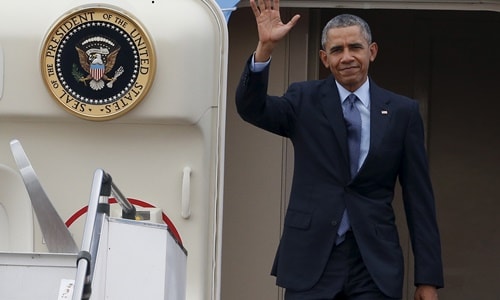US veterans talk about Obama's visit to Vietnam
The New York Times captures the thoughts and feelings of some Americans ahead of President Barack Obama's upcoming visit to Vietnam.
 |
US President Barack Obama will pay an official visit to Vietnam from May 23. Illustration photo: Reuters |
According to the New York Times, President Obama’s visit to Vietnam next week will certainly attract a lot of media attention. Hundreds of reporters, journalists, and cameramen will follow every step of the White House leader because he is only the third US president to visit Vietnam since the end of the war.
Former US Defense Secretary Chuck Hagel said he was prepared for the memories that the articles and photos taken during the visit would bring.
“I knew those pictures would move me,” said Mr. Hagel, who served 12 months in Vietnam. “They certainly bring back memories.”
For President Obama, his visit to Vietnam not only helps him strengthen his pivot policy to Asia, but on the other hand, it is also an opportunity for him to strengthen security and economic relations with a partner that is playing an increasingly important role in the region.
For some American veterans of the Vietnam War, Obama’s visit has once again stirred up waves of emotion. But it has also reignited seemingly never-ending debates about the consequences of the war.
“There are still a lot of ghosts around here,” Mr. Hagel said in an interview. “There are still debates about the Vietnam War and what it meant to this country.”
“It still haunts us,” he said. “It was a terrible waste of human life.”
Former Secretary Hagel added that all the decisions he made as head of the Pentagon and the advice he gave President Obama stemmed from his experiences fighting in Vietnam.
Until today,The issue of searching for prisoners of war (POWs) and missing in action (MIAs) remains a persistent concern for many US lawmakers and military officials.
Some people believe that the US should now focus on bringing the bodies of soldiers who died in Vietnam back home. However, many leaders of veterans' organizations at a meeting held on May 13 at the White House insisted that Mr. Obama ask Vietnamese authorities whether or not American prisoners are still alive.
For other veterans, Mr. Obama's visit will be a welcome reminder of the past, because the ghosts of war are not something to be buried in the past.
Unlike former President Bill Clinton’s visit to Vietnam in 2000, this time, Mr. Obama will not focus on the losses that both countries suffered in the war. Instead, President Obama is likely to highlight the achievements that both countries have made in cleaning up Agent Orange residue.
But as an American president visiting Vietnam many years after the war ended, Mr. Obama will probably not be able to become a symbol to help heal the emotional wounds that countless American veterans experienced when they returned home from the war. Many were despised in their own homeland for serving in Vietnam.
"That lack of welcome is a national disgrace," said Senator John McCain, a US veteran and former prisoner of war in Vietnam. "These are 18- and 19-year-old draftees who only knew how to do their duty, but when they returned, they were treated with disdain by their own people."
According to Senator McCain, America has now learned its lesson but Mr. Obama's visit can still evoke bitter memories in them.
In addition, Mr. McCain also said that one of the things that made him feel most proud in his entire life was his efforts to contribute to the normalization of Vietnam-US relations. The Arizona Republican senator also revealed that he returned to Vietnam so often that he was more familiar with the streets of Hanoi than Phoenix.
"I still get up really early sometimes and go to the Vietnam War Memorial when the sun is just coming up," McCain said in an interview. "It's always a wonderful experience for me to think and reminisce."
According to VNE

